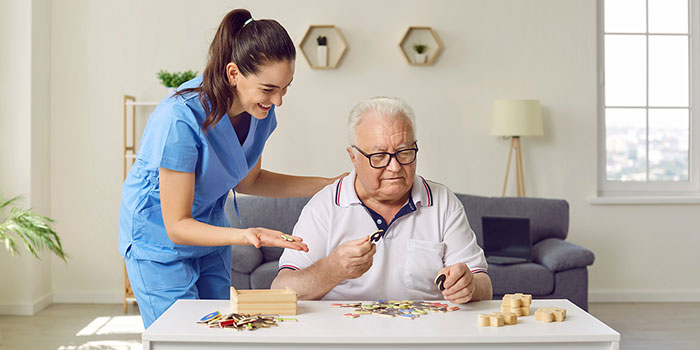Use It Or Lose It! 3 Ways to Support Brain Health

Use It Or Lose It! 3 Ways to Support Brain Health
Let’s pretend you’re on a fly-over of one of the most populated “megacities” in the world — Los Angeles, California.
Below you, sprawling across 500 square miles, live four million people.
Add a few hundred thousand more people and you’ve got the number of seniors in the US living with cognitive decline. Living alone with cognitive decline.
4.3 Million People In Trouble
A University of California, San Francisco’s The Living Alone With Cognitive Impairment Project study, has more disturbing findings about those 4.3 million seniors living alone:
- One-half of them (46%) are having trouble with basic life tasks like shopping for food or bathing.
- Three out of four (72%) are having difficulty finding someone to help them.
As one woman interviewed by the researchers put it, “I have a hard time remembering now. I really hate that. That’s tearing me apart. And I don’t know what to do.”
That’s heartbreaking in the immediate situation. But unless she finds a way to get help – maybe have family, friends, neighbors, even casual observers recognize she’s in trouble – her future is precarious.
Her cognitive decline will only accelerate.
At AgeRight Care at Home we know how important it is for seniors living alone to enjoy social interactions, whether it’s with family and friends, or our professional caregivers providing anything from meal prep, personal hygiene, medication management or physical, occupational and speech therapies.
Learning New Things
“It’s a myth that seniors, even with dementia, can’t learn new things,” says William Gaskill, MD and
CMO, AgeRight Clinical Services.
One of my favorite new things to teach others is cribbage which I’ve played many times with residents, including those with dementia. It’s pretty easy, requires some concentration – though not a major memory requirement – and usually leads to conversations, which are a mind-healthy benefit.”
“There’s a significant body of evidence that suggests even basic interactions keeps our brains active, stimulated and delays progression of cognitive decline.”
Benefits of In Home Care and Home Health Services
Dr. Gaskill says that if and when it’s time, a quality provider like, AgeRight Care at Home can promote cognitive health, slow decline and improve quality of life.
“Services like home care and home health are a great benefit for seniors who struggle with mild cognitive impairment but who can still live safely on their own. Having a provider come in several times a week can also provide a structured environment that sparks human interactions.”
If there’s a senior in your life who appears to be experiencing cognitive decline, step in and help with the following 3 tips, or work with a home healthcare provider who can support your loved one with these fun brain boosters:
Tip #1 Encourage Learning New Things
Find out what your senior used to love to do and what he or she likes now. Then gradually expand to more challenging exercises. A few ideas…
- Games galore. From board games to card games to the standbys like puzzles, crossword, sudoku, scrabble, Words with Friends and Wordle — the choices are endless. Consider playing cribbage, which is fairly simple, requires concentration and usually leads to great conversation. SWOOP is a trending and lively new card game. A company called Mind Frame Puzzles blends tabletop games, magic and puzzles in each box.
- Pick podcasts and books-on-tape over TV. Ask them to read an article, recount 3-10 things they learned, then ask them some questions.
- Go virtually shopping. For instance, hop on the internet and go bargain shopping with the goal of making their favorite recipe as inexpensively as possible. Let’s say it’s Pasta Primavera. Research which store has noodles or vegetables on sale. Is it worth the price of buying organic? Which vegetables are best consumed as organics? List out all the stores where you’ll shop. Then decide how you can use leftovers or unused items to make other meals.
For car aficionados, you might decide when your imaginary car needs an oil change and other tune-ups. Then look for the least expensive place to get that done. - Pick up the phone. Our cell phones are excellent tools for learning. Help your senior learn new ways of using their phone: navigation, faster texting, taking and editing photos or issuing voice commands. We are never too old to learn technology. That’s another myth, by the way.
- Make new memories. It’s never too late to make a dream come true or satisfy a life-long curiosity by learning a new skill, taking up a new hobby or visiting a new place. Ask your senior what they’d like to see and do.
Tip #2 Encourage Social Connections
Make sure you and your loved ones are seeing friends. Whether it’s over lunch, at book club, some good-natured yelling at the TV on college game day, taking walks, gardening or sharing a few chocolates and a glass of red wine over happy hour — being around people is like a vitamin for the brain.
For families, it’s important to set up a regular time to call or Facetime, not just text. It makes them feel important and valued and they look forward to that call more than you know. Also, having a pet or engaging in animal therapy. Dogs are proven to encourage exercise, reduce stress, depression and anxiety. And that’s good for cardiovascular health.
Tip #3 Encourage Physical Health
This includes good nutrition, hygiene, exercise and sleep.
- Exercise: In his bestselling new book, Outlive, the Science & Art of Longevity, Dr. Peter Attia, says “Our most powerful tool for preventing cognitive decline is exercise. Exercise – lots of it – is a foundation of our Alzheimer’s-prevention program.” High blood sugar levels and blood pressure contribute to cognitive decline. When we exercise, we fire up the endorphins, lower blood sugar levels and blood pressure. We don’t have to run a marathon. Simple short, daily walks are enough. Even if it’s something small, like walking to the nurses’ station and back a few times, doing ankle pumps or seated exercises. For more on exercise, check out our blogs on Five Ways You Can Regain Your Active Lifestyle, and Three Ways To Achieve Physical Balance, Just Like An Olympian.
- Diet: All of us, especially seniors, should follow a healthy, low sugar diet plan like the Mediterranean Diet. Study after study heralds the colorful and fiber-rich Mediterranean Diet as the healthiest way to eat. Don’t forget those brain and immune system boosters like vitamins D, B, B6, B12 and C.
- Oral Hygiene: Studies are showing a possible link between poor oral hygiene and Alzheimer’s disease. Brushing teeth regularly and properly and most of all – and somewhat surprising – flossing, prevent inflammatory markers that may contribute to cognitive decline.
- Sleep: The latest brain science is backing up what researchers have long suspected –– not getting enough sleep is a potential risk factor for neurodegenerative diseases like Alzheimer’s. Dr. Peter Attia says that “sleep is when the brain heals itself…sweeping away intracellular waste that can build up between our neurons.” Find out how much sleep your loved one is getting and what may be contributing to poor sleeping patterns. Remember, cognitive health means taking good care of the mind, body and spirit! A popular app for mental health is Calm, which has daily meditations, restful music and a large array of stories to help you fall asleep.
“I think we’re in a very exciting time in terms of our evolving understanding of how the brain works and how we may be able to prevent and treat certain types of dementia medically in the near future,” says Dr. Gaskill. “In the meantime, look around. Is there a senior who needs help?”
__________
If your loved one needs AgeRight Care at Home services, please contact us to learn how we might be of help.
Recent Posts
Aging Well At Home — Even With COPD
24th Nov 2023Building Balance – Part Two
18th Oct 2023Building Balance – Part One
21th Sep 2023© 2026 AgeRight Care at Home | Privacy Policy



